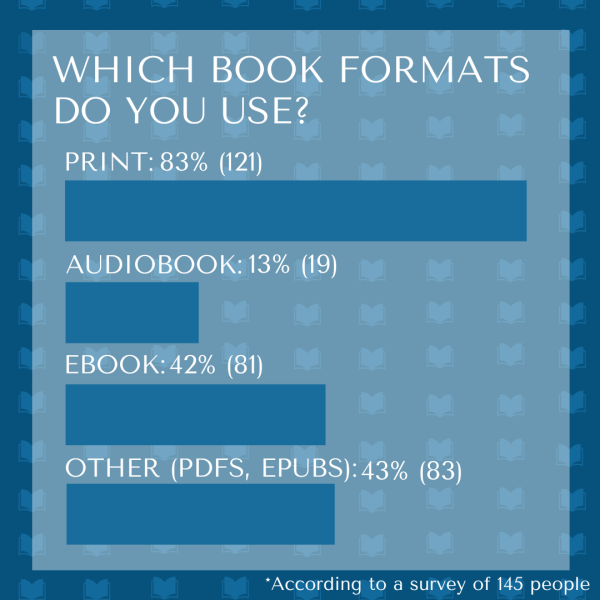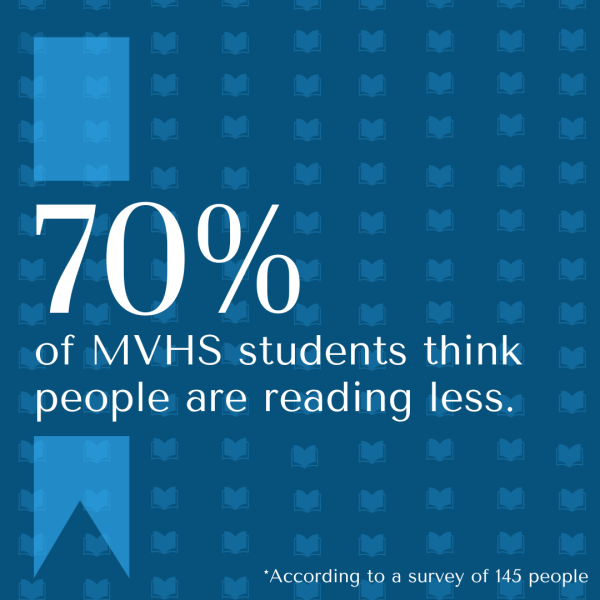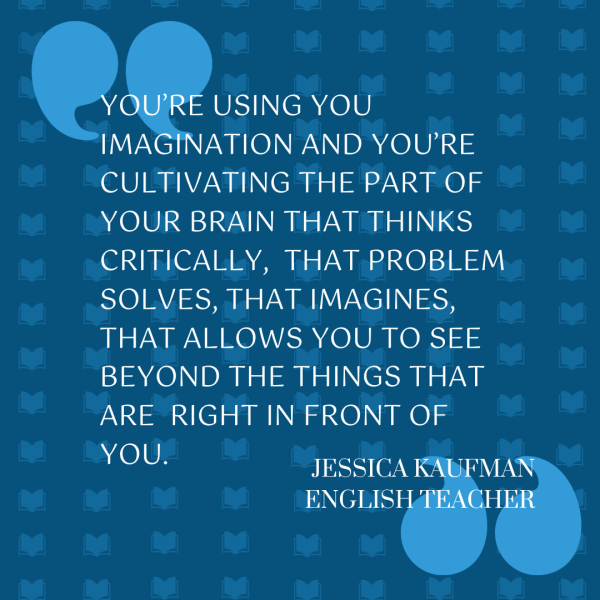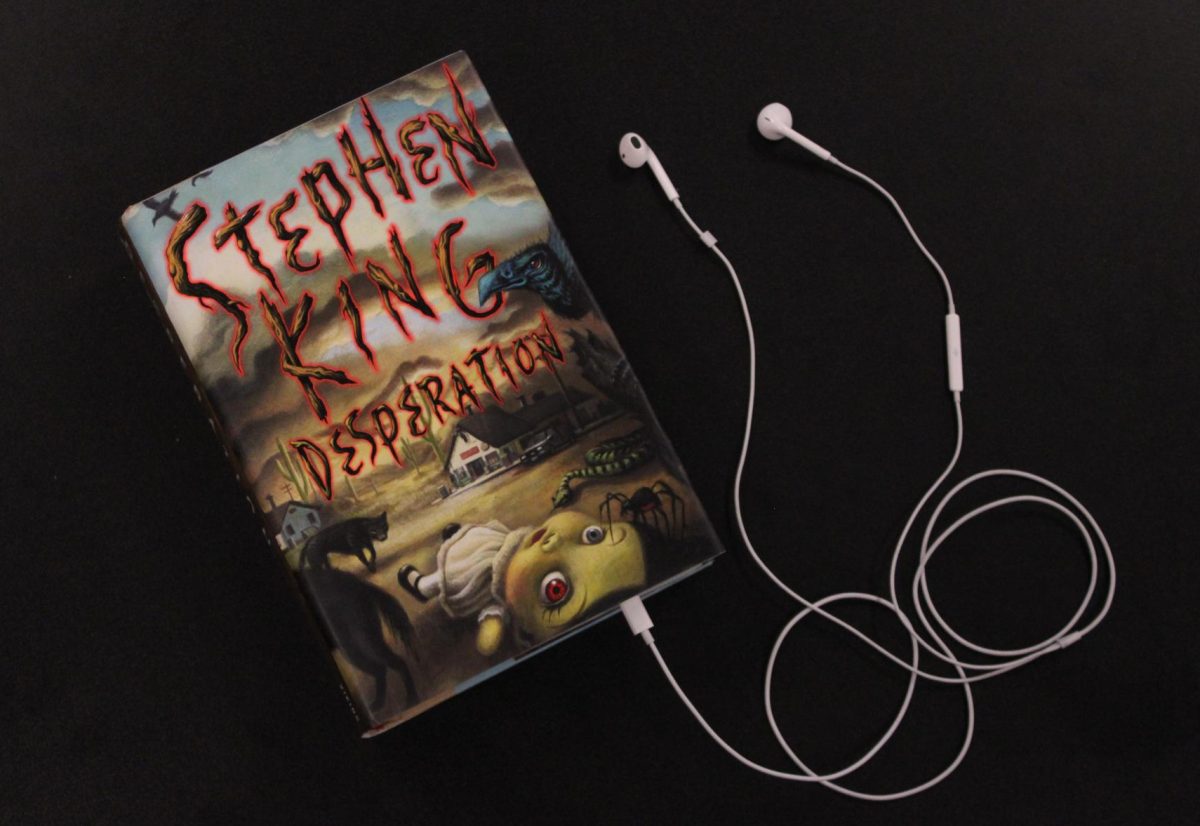Growing up during the advent of the digital age in the 90s, English teacher Jessica Kaufman considers herself to have had an upbringing sheltered from internet usage. While people shifted away from physical forms of media such as encyclopedias to the vast array of information online, Kaufman relied on reading books to access knowledge. As reader numbers continue to falter and media grows predominantly digital, Kaufman says people are losing the capacity for consuming information through books.
“There’s a lot out there now and you can have access to any information at your fingertips,” Kaufman said. “You’re so used to things being so quick, and [now] things are created that way to be digested really quickly because [the] attention span has shrunk. It’s great [that] you guys have a lot of other information that I didn’t have as a child, and you’re more engaged in society and in life than I was, but I do think it leads to a lot of distraction, which means reading long-form things is becoming less and less doable.”
While print books remain the most popular format for reading, a Pew Research Center study shows that 30% of Americans who read now read e-books and 23% listen to audiobooks. The MVHS library began offering e-books in 2013, eventually expanding to a virtual library with audiobooks and multiple-use e-books which several students could access at the same time, according to Library Media Teacher Laura Utile. Utile says the database of texts is a helpful resource for students, and currently makes students aware of these resources by presenting about the digital library in classes.

Kaufman says electronic devices tend to be more portable than print books, which can allow people to have access to information wherever they are. Another advantage of reading online is interactivity — many e-books allow readers to customize fonts, margins and other features for easy reading. Junior Meghana Somu finds that reading on her iPad also allows her to have access to a larger array of books and makes it easier to interact with the text through digitally annotating.
“It’s more convenient in general because if you want to buy an e-book, it’s way less expensive than physical books are,” Somu said. “Also, you don’t have to go anywhere to get the book. You don’t have to go to the library and check out a book, you can just do it from your device.”
Unlike Somu, Kaufman prefers reading print books, citing the physicality of turning the page and her improved ability to absorb the content. Utile also gravitates towards print books, sometimes accompanied by an audiobook, which she believes can improve her engagement in the reading experience.
“For pleasure reading, I’d rather not be on a device, because there’s so many different things that might pop up and distract me,” Utile said. “I want to decompress and not be tied to technology. When I just need bits and parts of [the book], it’s much easier to search in a digital format.”
Somu agrees that reading on a device makes the reader more prone to distractions. If the book isn’t engaging enough, Somu often finds herself wandering to other apps such as Instagram. Kaufman sees these distractions that come with reading online as a disadvantage of book digitization.
“That’s where reading things in paper in print can come into play, because you can still have the same experience, but it’s freeing to not have to do it to be so connected,” Kaufman said. “[Being online] is definitely something I have to be very conscious of. Now, I make it a point to leave my phone in the other room for a half-hour at the very minimum and actually read a book because I think that it’s calming and it’s freeing to know that I don’t have to [be online].”
For Utile, reading provides an escape from the pressure of daily life. While she considers reading a crucial part of maintaining her own wellness, she also acknowledges how addictive short-form content can be.
“In this digital age, with all these TikToks and all of the other stuff out there, some people may be engaging less in books that we have in the past, because there’s so many other distractions out there to pull them away,” Utile said. “It’s easy to go down a rabbit hole [on TikTok], because it’s tracking you like, ‘Oh, you watched this video, we recommend you watch this video [then] this video.’”
Senior Aya Abdelrahman believes that reading books is becoming more of an obscure hobby among her generation due to the surge in popularity of other forms of entertainment. She feels reading a book is a large investment of time and energy, especially when compared to less taxing and more fast-paced pieces of online media. Abdelrahman has found it increasingly difficult to choose reading books over consuming easily digestible forms of digital media such as TV shows.

“Now, people will be like, ‘Why would I [read] when I could just scroll on TikTok for two hours at a time,’ because when you read, it’s the same content for a longer time where TikTok gives a new thing every 15 seconds,” Abdelrahman said. “Apps like TikTok, Instagram Reels [and] YouTube Shorts [have] really lowered [peoples’ desire] to read.”
As younger generations primarily receive information from online media platforms that optimize content to present a plethora of ideas and opinions, Abdelrahman says constantly consuming this format of content leads to people losing the ability to form independent opinions. Kaufman emphasizes the importance of finding balance in this trend of consumption, specifically through implementing reading in our lives as a consistent way to employ critical thinking. In turn, Kaufman says, people can be better equipped to interpret online information.
“Reading is like a form of escape that’s unlike any other,” Kaufman said. “You’re in your own head, but in the best possible way. You’re using your imagination [and] you’re cultivating the part of your brain that thinks critically, that problem solves, that imagines, that allows you to see beyond the things that are right in front of you. That’s [how] doing something like reading [allows you to] engage digitally in a better way. You’re able to look at something online and say, ‘Oh, this isn’t actually what’s happening.’”

Likewise, Utile sees the ability to read and interpret text as the basis to developing critical thinking and comprehension skills, stating reading “[stimulates] your mind in a different way than what’s on the device.” Kaufman understands that book-reading has become increasingly daunting for people who are heavily online, finding that e-books provide a more approachable option. Regardless of what format of book-reading people choose, Kaufman encourages everyone to find space in their daily lives for reading.
“Whether you [read] in a digital format [or] on a paper format, in a magazine [or] a news article, whether you read four lines or 20, reading is reading,” Kaufman said. “I think that ultimately, engaging in stories is what’s really important. My biggest goal is to get you guys reading and reading something that you enjoy.”












